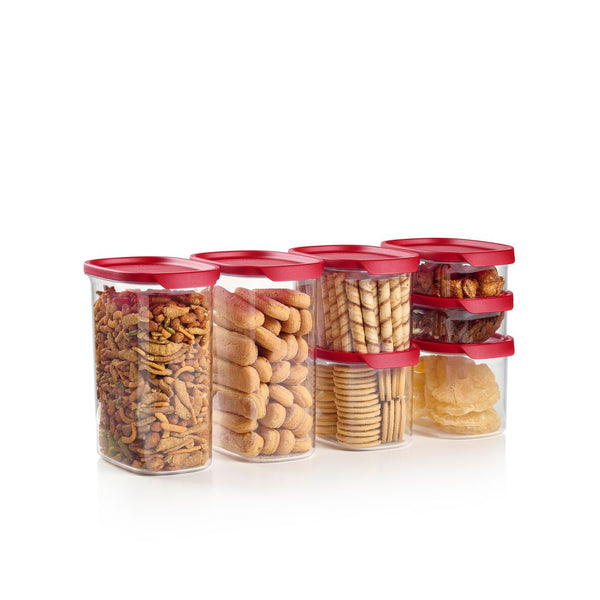Student Tip - How to Keep Food Fresh for Longer
Whether you're a busy college student or simply looking to make your groceries last, this article offers valuable insights and tips to help you keep your food fresh for longer. College life can often be a whirlwind, leaving little time for grocery shopping or elaborate cooking. However, by understanding the importance of keeping your food fresh for longer, you can ensure not only the taste and quality of your meals but also your overall well-being.
In this article, we'll provide you with practical and easy-to-implement tips and tricks that will help extend the shelf life of your favourite meals. We'll cover a range of topics, from proper food storage techniques to the benefits of freezing and using airtight containers. With these strategies, you can optimise your food usage, minimise waste, and save time for your weekly activities.
So, whether you're dealing with limited kitchen resources or simply want to make the most of your groceries, join us as we explore simple yet effective ways to keep your food fresh for longer. Let's dive in and discover the secrets to making your ingredients and meals last, ensuring that you always have delicious, nutritious options at your fingertips.

Store Food Properly
Proper food storage plays a crucial role in maintaining freshness and preventing waste. When you store food correctly, you not only extend its lifespan but also preserve its taste and nutritional value. Let's start with fruits and vegetables. To keep them fresh, it's essential to store them in the right conditions. Most fruits, such as apples and bananas, can be stored at room temperature, while delicate berries and leafy greens should be refrigerated.
For meat, poultry, and fish, it's important to keep them in the coldest part of your refrigerator, preferably in airtight food containers or wrapped tightly to prevent cross-contamination. As for dairy products like milk and cheese, they should be stored in the refrigerator at temperatures below 40°F (4°C) to inhibit bacterial growth and maintain their freshness. With these practical refrigerator storage tips, you’ll be able to see your foods lasting longer.
Freeze Food
Freezing food is an excellent way to prolong its freshness and save time in the long run. Freezing not only halts bacterial growth but also helps retain the flavour, texture, and nutritional content of various ingredients.
Tips for freezing fruits and vegetables
- Blanch them briefly in boiling water to preserve colour and texture.
- Submerge them in ice water to stop the cooking process.
- Dry them thoroughly before transferring to airtight containers or freezer bags to prevent freezer burn.
Tips for freezing meat, poultry, and fish
- Wrap them tightly in freezer-safe containers to avoid moisture loss and contamination.
- Divide larger cuts into smaller portions for easier thawing and usage.
- Label the packages with the date for better organisation and tracking.
Tips for freezing leftovers
- Cool the leftovers completely before storing them in portion-sized containers.
- Ensure airtight packaging to prevent freezer burn and maintain freshness.
- Label the containers with the date and contents to easily identify them later.
By following these food freezing tips, you can effectively preserve the freshness of various ingredients and have a convenient supply of ready-to-use food at your fingertips.
Use Airtight Containers
Using airtight containers, such as the popular airtight tiffin box in Malaysia, offers several benefits when it comes to keeping food fresh for longer periods. These containers create a barrier that prevents air from entering and moisture from escaping, effectively preserving the quality and taste of your stored food. They also help prevent odours from spreading and minimise the risk of cross-contamination.
When choosing airtight containers, opt for those made from materials like glass or BPA-free plastic, ensuring they have tight-fitting lids to create a proper seal. Mason jars, glass storage containers with locking lids, and vacuum-sealed bags are excellent examples of airtight containers that can keep your food fresh. These are not only practical but also environmentally friendly, as they reduce the need for single-use plastic wraps or bags. By investing in a few reliable airtight containers, you can significantly extend the lifespan of your food and reduce unnecessary waste.

Keep Food Dry
Keeping your food dry is crucial for maintaining its quality and preventing spoilage. Moisture can lead to the growth of bacteria and mould, accelerating food spoilage. To store food in dry conditions, make sure to pat dry any excess moisture from ingredients before storing them. Utilise food storage containers with tight-fitting lids to create a seal and prevent moisture from entering. To prevent moisture buildup in your fridge, ensure proper ventilation by not overcrowding the shelves and allowing air to circulate. Regularly check for condensation and wipe it away to maintain a dry environment. By following these tips, you can keep your food fresh and free from moisture-related issues.
In conclusion, implementing proper food storage practices and utilising techniques like freezing and using airtight containers can make a significant difference in keeping your food fresh for longer. By following the tips mentioned in this article, you can reduce waste, save money, and ensure that you always have fresh ingredients at hand. Remember to store fruits, vegetables, meats, poultry, and fish in their respective optimal conditions and temperatures. Don't forget the benefits of freezing leftovers and using airtight containers to maintain the quality of your food. So, why not start implementing these simple yet effective tips in your daily routine? Your taste buds, wallet, and the environment will thank you!
